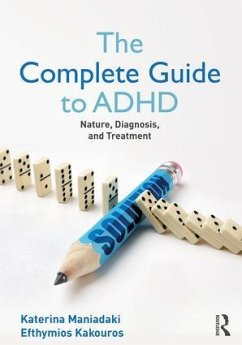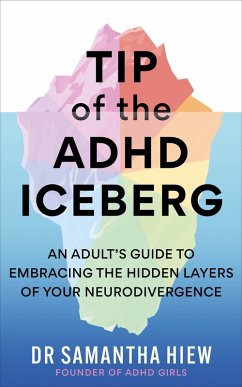
Experiences and Explanations of ADHD
An Ethnography of Adults Living with a Diagnosis
Versandkostenfrei!
Versandfertig in 6-10 Tagen
45,99 €
inkl. MwSt.

PAYBACK Punkte
23 °P sammeln!
Experiences and Explanations of ADHD: An Ethnography of Adults Living with a Diagnosis presents research on the lived experiences of those diagnosed with attention deficit hyperactivity disorder (ADHD). Drawing on in-depth interviews with adults diagnosed with ADHD, the book provides an examination of how the diagnosis is understood, used, and acted upon by the people receiving the diagnosis.The book delves into the phenomenology of ADHD and uncovers the experiences of a highly debated diagnosis from a first-person perspective. It further considers these experiences within the context of our t...
Experiences and Explanations of ADHD: An Ethnography of Adults Living with a Diagnosis presents research on the lived experiences of those diagnosed with attention deficit hyperactivity disorder (ADHD). Drawing on in-depth interviews with adults diagnosed with ADHD, the book provides an examination of how the diagnosis is understood, used, and acted upon by the people receiving the diagnosis.
The book delves into the phenomenology of ADHD and uncovers the experiences of a highly debated diagnosis from a first-person perspective. It further considers these experiences within the context of our time and culture and contributes to a discussion of how to understand human diversity and deviance in contemporary society. Studying both societal conditions behind the emergence of ADHD, questions concerning everyday life with ADHD, and interpretations of the diagnosis, the book offers an analysis of the intertwinement of experiences of suffering and diagnostic categories.
This book will appeal to academics, researchers, and postgraduate students in the fields of cultural psychology and medical anthropology, as well as those with an interest in the sociology of diagnoses.
The book delves into the phenomenology of ADHD and uncovers the experiences of a highly debated diagnosis from a first-person perspective. It further considers these experiences within the context of our time and culture and contributes to a discussion of how to understand human diversity and deviance in contemporary society. Studying both societal conditions behind the emergence of ADHD, questions concerning everyday life with ADHD, and interpretations of the diagnosis, the book offers an analysis of the intertwinement of experiences of suffering and diagnostic categories.
This book will appeal to academics, researchers, and postgraduate students in the fields of cultural psychology and medical anthropology, as well as those with an interest in the sociology of diagnoses.














